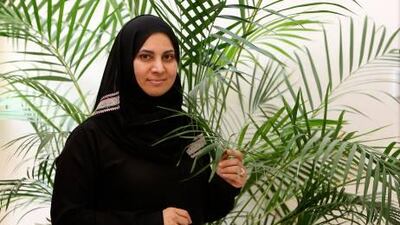With two decades of green experience, Habiba Al Marashi may be the UAE environmental movement's most recognisable figure.
In 1991, Mrs Al Marashi witnessed the birth of the Emirates Environmental Group (Eeg), the country's oldest and most-established formal green organisation. She has been its chairwoman since 1995.
The roots of her involvement with environmental issues are deep, going back to her mother, Sakina, who is now 72.
One lesson for Habiba and her nine siblings was the importance of giving to the community.
"We were never taught to ask what we get out of it," she says.
The teachings of the Quran were also an influence.
"My mother is a very staunch supporter of the environment in the true sense of the religion," Mrs Al Marashi says. "We have a lot of teachings in Islam about how important it is to be conservative in our use of resources."
Initially, her green efforts were limited to admonishing friends and relatives about excessive water use and plastic plates. But after she connected with a group of like-minded people, this self-confessed "nag" became a full-fledged environmental activist.
In 1990, she joined a course in flower arrangement and silk painting in Dubai. The teacher, Ali Ritchie of New Zealand, was recommended by Mrs Al Marashi's sister.
"She said, 'Habiba, there is a lady who speaks your language. You will enjoy meeting her'," she says.
It turned out that the group of 12 women all loved nature and eventually came up with the idea to organise formally around the issues of waste, water and energy.
Their first public meeting in 1991 was attended by UAE nationals and residents from Finland, Denmark, Germany, India and Pakistan.
"Our goal was to help government organisations do it right," Mrs Al Marashi says.
Eeg's first public lecture, held in October 1992, attracted 180 people. The group has since been organising such events once a month, except during the summer, to educate on environmental issues.
"I think the Eeg plays an appreciable role in attempting to propagate community recycling schemes in the UAE, and also in developing general environmental awareness," says Huzaifa Rangwala, the marketing and contracts manager at Union Paper Mills.
Every year the group helps to divert hundreds of tonnes of paper, plastic and metal away from landfills and into recycling centres.
Eeg has also opened recycling centres in 18 schools and organises campaigns to collect old batteries, printer cartridges, and toner and electronic waste.
"One of our success factors is the consistency of our programmes," Mrs Al Marashi says.
Eeg's can-collection campaign, in which volunteers gather aluminium drink cans and send them to a recycling company in Jebel Ali, has run since 1997.
In her first five years as the Eeg chairwoman, the mother of four also had a full-time job at the Dubai Development Board, where she oversaw administration and human resources. In 2000, she dedicated herself fully to Eeg.
The job is busy and requires a patient family, she jokes, as well as good communications skills.
"You need to be a good communicator, bartering agreements, forging partnerships, catering to people's needs," Mrs Al Marashi says. "Human beings are very complicated creatures. You need patience. You learn to listen more than you speak."
A positive attitude to life is also needed as environmental change is sometimes slow to come, she says.
"While we have seen many improvements and a lot of good work, we have seen it [done] in a corrective manner," says Mrs Al Marashi. "You have to admit that the county has developed very fast. With that there is a price to pay."
Rather than react to problems, authorities should develop long-term strategies on managing issues such as waste, water and energy use and urban development, she says. Waste management is an urgent priority for her.
"I believe it is not tackled the way it should be. Dubai is a small emirate. We have already filled up four landfills and we are already filling up the fifth."
Overall, the Emirates should start by reviewing and updating legislation, Mrs Al Marashi says.
"We have not dealt with the basics. Until we have a comprehensive environmental law that is implemented universally across the UAE, we are still at a vulnerable situation."
Despite all the issues, she says, there are good environmental stories in the UAE - public transport in Dubai, the Estidama green building system in Abu Dhabi, and waste management in Sharjah - and they need to be copied all over the country, she says.
"We have to learn how to work with each other, how to stop recreating the wheel," Mrs Al Marashi says.

